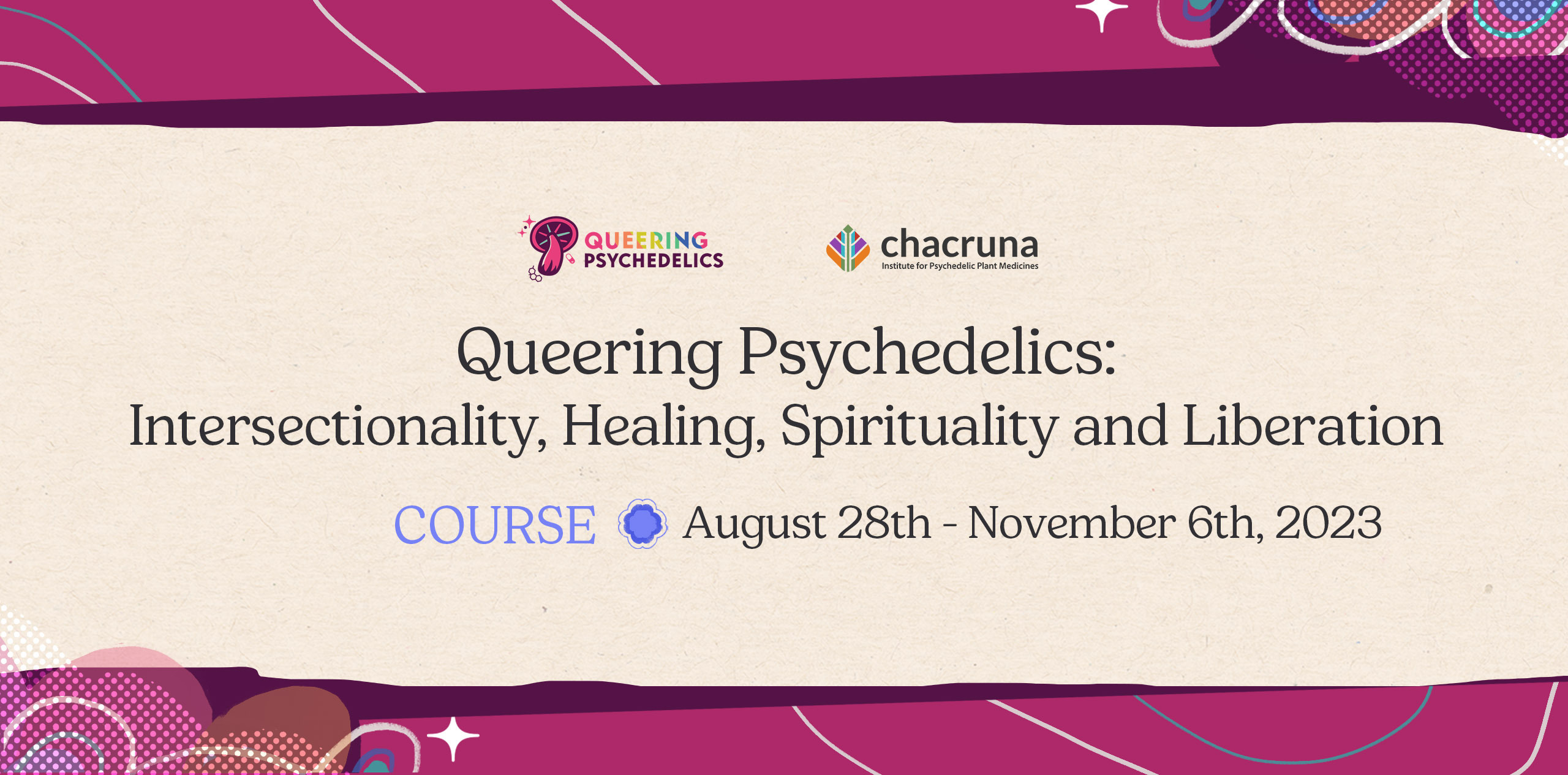- Meet Chacruna at Psychedelic Science 2025 - May 27, 2025
- Psychedelics and Attachment: Fundamentals, Implications, and New Frontiers - May 16, 2025
- Development Outreach Internship (OPEN) - May 6, 2025
August 28th – November 6th, 2023, 10:30am-12pm PDT/1pm-3pm EST
Price $ 650 USD
Price $280 for CE credits
Course Description
Psychedelics have encompassed a colorful history of the enchanted, wayward, and weird; its history also includes concrete ways queer folk have fundamentally shaped the substance, style, and spirituality of the psychedelic movement. At the same time, some queer people have been harmed by psychedelic culture’s heteronormative assumptions. As the psychedelic renaissance reaches a pivotal moment of mainstream interest and regulatory legitimacy, this course aims to foster accessibility and diversity in psychedelic science, practice, and discourses by addressing and dismantling sexist, heteronormative, transphobic, and homophobic forms of oppression in the psychedelic movement. This course will cover topics such as the cruel effects of patriarchy, practicing self-acceptance, the dark sides of psychedelic research such as conversion therapy, the move towards LGBTQ+ affirmative psychedelic-assisted therapies, transpersonal queer spirituality, sex positivity, trans and BIPOC issues, Indigenous perspectives in queer psychedelia, and pleasure. The course also grapples with how modern psychedelic research might address the unique needs and traumas of sexual and gender minorities—populations that can suffer from challenging mental health conditions brought on by social exclusion, pathologization, criminalization, and stigmatization. It is vital that queer spaces be established for exploring the unique needs, gifts, and strengths that LGBTQ+ communities bring to psychedelic medicine, and how psychedelic medicine can help queer folks move towards healing and liberation.
Student Learning Objectives
At the end of the program, participants will be better able to…
- Students will be able to name three characteristics of the patriarchy that influence life today
- Students will be able to describe the difference between “positive psychology” and “clinical psychology”
- Critique the heteronormative ideology that enforces a myth of “normal”
- Apply the spiritual philosophies of polyamory and kink regardless of one’s own sexual behavior
- Describe factors affecting clinician competence with transgender clients in psychedelic therapy
- Analyze the cissexist impact of European colonialism and its impact on modern concepts of the sacred
- Describe how identity-based trauma can impact the relationships, sexuality, and self-perception of LGBTQIA+ people
- Discuss the role of pleasure in the psychedelic experience and how it can promote healing in queer people and communities
Information on Continuing Education Credits for Health Professionals
- CE credits for psychologists are provided by the Spiritual Competency Academy (SCA) which is co-sponsoring this program. The Spiritual Competency Academy is approved by the American Psychological Association to sponsor continuing education for psychologists. Spiritual Competency Academy maintains responsibility for this program and its content.
- The California Board of Behavioral Sciences accepts CE credits for LCSW, LPCC, LEP, and LMFT license renewal for programs offered by approved sponsors of CE by the American Psychological Association.
- LCSW, LPCC, LEP, and LMFTs, and other mental health professionals from states other than California need to check with their state licensing board as to whether or not they accept programs offered by approved sponsors of CE by the American Psychological Association.
- SCA is approved by the California Board of Registered Nursing (BRN Provider CEP16887) for licensed nurses in California. RNs must retain their certificate of attendance for 4 years after the course concludes.
- For questions about receiving your Certificate of Attendance, contact [email protected]
For questions about CE, contact Spiritual Competency Academy at [email protected].
CE Credit Requirements
- Student must be in attendance with their camera on for the entirety of the class session
- Student must be actively participating in the class session (asking questions, contributing to discussion, etc.)
- Student must fill out an evaluation and assessment form at the end of the course, which will be provided by Chacruna
- Collective CE credits will be awarded at the end of the course given that all of the above requirements are met
*please note that you must purchase a ticket for CE credits on Eventbrite in order to receive CE credits
*please note that if you miss a class, you will not be awarded CE credits for that session and cannot be refunded for the CE cost
*please note that the first and last class do not count towards CE credits
Class Recordings and Lecture Slides Policy
Recordings of the lectures will be sent to the students a week before the class is scheduled to take place.
Lecture slides from the classes may be provided to the students at each professor’s discretion. We encourage everyone to come to each class in-person and on time as we cannot guarantee providing these resources in all circumstances.
You can find more information to Frequently Asked Questions here.
Classes
Click on the class to read the description
Class One – Introduction
Monday, August 28th, 2023, 10:30am–12pm PDT/1:30pm-3pm EST
Professors: Bia Labate, Ph.D (she, her), Ligia Platero, Ph.D (she/her), Alejandra Barajas (she/they/him)
In this initial class, students will introduce themselves to others in the course, be introduced to the professors and their backgrounds, and gain an understanding of the curriculum and program. Students will leave with preparation for the following classes being taught and a general understanding of the topics that will be discussed throughout the course.
Class Two – Psychedelics and Sexuality: Dismantling the Patriarchy and Practicing Self-Acceptance
Monday, September 11th, 2023, 10:30am–12pm PDT/1:30pm-3pm EST
Professor: Clancy Cavnar, Psy.D, (she/her)
This class will explore the capacity of psychedelics to help people accept themselves, with a focus on acceptance of sexual orientation and gender. The tendency for psychedelics to reinforce positive qualities associated with mental health and spiritual attainment will be reviewed, and the ways these qualities influence self-acceptance will be explored. Psychedelics are once again being used in psychiatric settings for various mental health indications, including to alleviate end-of-life anxiety, to combat depression and PTSD, and to treat addiction; I suggest that psychedelics may be of use in helping gay, lesbian, and transgender people accept themselves in the face of patriarchal judgment and rejection, and thus live happier, more fulfilling lives. Using psychedelics to help deconstruct negative introjects absorbed from moribund cultural frameworks may be a way to utilize these substances to heal an oppressed population.
Class Three – Psychedelic Conversion Therapy and the Development of LGBTQ+ Affirmative Psychedelic-Assisted Therapies
Monday, September 18th, 2023, 10:30am–12pm PDT/1:30pm-3pm EST
Professor: Alex Belser Ph.D, (he/they)
While the psychedelic research community acknowledges the harmful psychedelic practices perpetrated by MKUltra, it is largely unaware of the use of psychedelics as a form of “shock therapy” or conversion therapy for gender and sexual minority individuals, which was widely documented in the United States, Canada, France, and the United Kingdom. This class will trace the past, present, and future of psychedelic medicine’s interactions with the LGBTQIA+ community in therapeutic practice. To address past violence, we will explore the theoretical and clinical approach to psychedelic conversion therapy as abusive. In the present, we will summarize heteronormative practices in psychedelic research, including the dominance of male-female therapy dyads, non-affirming gender practices, non-diverse patient recruitment, and non-reporting of research outcomes for LGBTQIA+ patients. Looking towards the future, we will provide a set of specific recommendations for working with LGBTQIA+ patients, including developing best practices, treating sexual minority stress with LGBTQIA+ affirmative psychedelic therapies, uniformly assessing gender and sexual identity using a proposed standard questionnaire, and treating crystal meth addiction using psychedelic harm reduction among men who have sex with men. We will offer a critique of unethical practices and suggest ways the psychedelic research and clinical communities can work to dismantle heteronormative, transphobic, and homophobic forms of oppression in their praxis.
Class Four – The Transpersonal Queer Spirituality of Sex-Positivity
Monday, September 25th, 2023, 10:30am–12pm PDT/1:30pm-3pm EST
Professor: Justin Natoli, JD, LMFT, (he/she/they)
Did you know you can be polyamorous and kinky without ever having sex? That’s because terms like “poly” and “kinky” are more than just ways to describe sexual behavior. They can also be part of a queer, sex-positive spirituality that honors the sacredness of human diversity. In this class, we will identify how sin-based religions reinforce institutions of power by creating heteronormative cultures of shame, scarcity, and disconnection. We will also explore how the transpersonal philosophy of sex positivity can help us move back into right relationship with ourselves, each other, and the planet. We will pay special attention to queer wisdom from the polyamorous and kink communities. These communities encourage us to discover our unique sexual personalities and teach us that love and pleasure are abundant if we remove the barriers within us that restrict their natural flow. In this way, we can benefit from the wisdom of sex positivity even if we never change our sexual behaviors.
Class Five – Trans Issues in Psychedelic Medicine
Monday, October 2nd, 2023, 10:30am–12pm PDT/1:30pm-3pm EST
Professor: Taylor Dahlia Bolinger, LMSW, (she/her)
The discussion of transgender inclusion in psychedelic medicine has only just begun. As a group that uses drugs and struggles with mental illness at elevated rates, transgender people stand to gain considerable benefit from psychedelic therapy. But transgender inclusion also poses several issues, including financial access, clinician cultural competence in medical settings, discrimination in ceremonial settings, psychedelic history, the nature of our subjective understanding of gender, and the limits of psychedelic healing. This class will address how transgender individuals experience poverty at an elevated rate, and hence are often excluded from accessing medicalized psychedelic therapy and many of the retreat centers located internationally. Because recent studies have shown that the majority of practicing mental health clinicians are not well enough versed in transgender issues to competently treat a transgender client without harming them, retraumatization during integration in a cissexist society also presents concerns. Additionally, this class will explore the conceptual problems transgender existence and history pose for various psychedelic-adjacent ideologies, such as paganism, divine femininity, Santo Daime, and UDV faiths. This ideological dissonance may lead to adverse outcomes in and around ceremonial settings. This is problematic because anecdotal evidence suggests that many transgender individuals either realized, accepted, or deepened their understanding of their gender identity with the assistance of psychedelic substances. However, the efficacy of gender affirming care also calls into question whether psychedelic medicine alone can resolve the emotional issues of transgender clients. In fact, there is a sense in which transgender identity is itself psychedelic, or “mind manifesting,” as it brings forth a new self in keeping with the individual’s self-representation.
Class Six – BIPOC Queer Providers working with Queer and BIPOC People
Monday, October 16th, 2023, 10:30am–12pm PDT/1:30pm-3pm EST
Professor: Jennifer C. Jones, Ph.D, LCSW, (she/her) & Aisha Mohammed, LMFT, (she/her)
In the last few years there has been a proliferation of discussions about the use of psychedelics for healing relational, existential, spiritual and/or generational pain. Only a limited number of these talks, papers and books have explored the experiences of BIPOC and queer people in expanded states being supported by queer and BIPOC practitioners. Often these discussions are more theoretical and speculative in nature or based on the speakers’/writers’ personal experiences. At this time, there is no published research data exploring the impact of the practitioners’ social location on the psychological safety of queer and BIPOC people using psychedelics in healing settings with practitioners who do not identify as queer and/or BIPOC. This interactive class will present anecdotal clinical data to begin to fill this gap. The session will discuss the professors’ queering of their work as therapists as they developed a collaborative healing practice together which predominantly centers people who identify as BIPOC and/or queer.In addition to sharing the voices of BIPOC and queer people who worked with us, topics to be addressed include: impact of social location on the work, building community, accessibility.
Class Seven – Unearthing Indigenous Wisdom and Multi-Spirit Traditions
Monday, October 23rd, 2023, 10:30am–12pm PDT/1:30pm-3pm EST
Professor: Kanyon Sayers-Roods
This class invites participants to delve into the rich history and oral traditions of the Mutsun Ohlone and other California Native tribes, with a focus on multi-spirit acknowledgment and celebration. With profound reverence for the land and its ancestral teachings, students will be guided through an exploration of academically recorded data, as well as knowledge passed down through oral traditions. Students will discover the fascinating narratives, rituals, and ceremonies that have shaped the spiritual fabric of Native American tribes, and specifically delve into the experiences of the Mutsun Ohlone people. Through an Indigenous lens, this class will also touch upon the use of ayahuasca and peyote as tools for personal growth, healing, and community development. Students will recognize the responsibility and integrity that is central to interacting with and deploying these medicines, drawing from deep ancestral connections and commitment to cultural preservation, which offers a unique opportunity to learn directly from an Indigenous perspective. This will be explored through an interactive discussion, thought-provoking exercises, and stories that shed light on the multi-spirit traditions and their relevance in contemporary society. Participants are invited to join in honoring and celebrating the profound heritage of the Mutsun Ohlone and other California Native tribes, while embracing the power of Indigenous wisdom to shape personal growth, community development, and the ongoing unsettling and decolonization of queer and psychedelic spaces.
Class Eight – Reclaiming Ecstasy: Exploring the Role of Pleasure in Queer Psychedelic Healing
Monday, October 30th, 2023, 10:30am–12pm PDT/1:30pm-3pm EST
Professor: Dee Dee Goldpaugh, LCSW, (they/them/theirs)
Psychedelics are enjoying a newfound respect as potential treatments for a multitude of mental health issues. The medical model has emerged as the dominant context in which psychedelic healing is sanctioned in the United States, while medical contexts remain an unsafe or unsupportive place for many LGBTQIA+ people. In an effort to promote psychedelic respectability and clinical acceptance, researchers have ignored one of the most powerful healing aspects of the psychedelic experience, pleasure. Why have we overlooked the ways in which simply feeling good can create deep inner transformation? What’s scary about acknowledging this aspect of the psychedelic experience? What’s important about queer people embracing pleasure for its own sake? This class will explore the concept of pleasure as a vehicle for healing, to support the creation of queer community bonds, and as a means of coming back to our bodies in joy. We will learn about the unique types of identity-based trauma queer, gender-expansive, and trans people experience, and the implications of trauma on self-esteem, relationships and sexuality. We will explore the role pleasure can play in the personal and relational healing of queer people and communities. This class will examine the concept of the erotic as a healing power and discuss ethical and safe ways to integrate the erotic into contexts for queer healing. Last, we will build a new vision for queer psychedelic healing that centers pleasure, intergenerational community, and joy.
Class Nine – Conclusion
Monday, November 6th, 2023, 10:30am–12pm PDT/1:30pm-3pm EST
Professor: Bia Labate, Ph.D (she, her), Ligia Platero, Ph.D (she/her), Alejandra Barajas (she/they/him)
In this final class, we will strive to summarize everything taught throughout the course. In doing so, we will recap the main concepts, highlight the main moments, and give folks a chance to voice any significant takeaways about the topics discussed. We will also do a critique of the course and think of ways to improve it for future teachings.
Professors
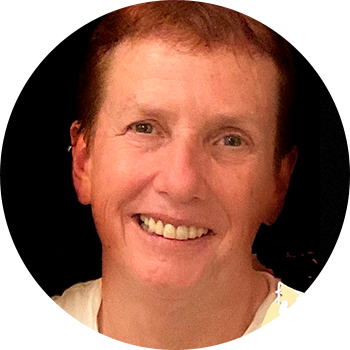
Clancy Cavnar (she/her) has a doctorate in clinical psychology (Psy.D.) from John F. Kennedy University in Pleasant Hill, CA. She currently works in private practice in San Francisco, and is Co-Founder and a member of the Board of Directors of the Chacruna Institute for Psychedelic Plant Medicines. She is also a research associate of the Interdisciplinary Group for Psychoactive Studies (NEIP). She combines an eclectic array of interests and activities as clinical psychologist, artist, and researcher. She has a master of fine arts in painting from the San Francisco Art Institute, a master’s in counseling from San Francisco State University, and she completed the Certificate in Psychedelic-Assisted Therapy program at the California Institute of Integral Studies (CIIS). She is author and co-author of articles in several peer-reviewed journals and co-editor, with Beatriz Caiuby Labate, of eleven books. For more information see: http://www.drclancycavnar.com.
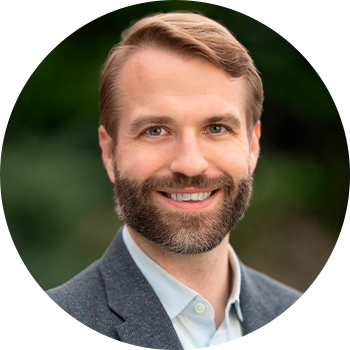
Dr. Alex Belser (he/they) is a licensed psychologist and researcher focused on psilocybin, MDMA, and DMT therapies. At Yale, Dr. Belser is investigating a psychedelic treatment for OCD. He is the Chief Clinical Officer of Cybin, where he co-created a new model of psychedelic-assisted psychotherapy called EMBARK. Dr. Belser is part of Chacruna Institute’s Women, Gender Diversity, and Sexual Minorities Working Group. He is co-editor (with Clancy Cavnar and Beatriz Labate) of Queering Psychedelics: From Oppression to Liberation in Psychedelic Medicine (Synergetic Press, 2022). Dr. Belser co-founded the NYU psychedelic research group in 2006 and was the founding President of Nautilus Sanctuary, the first non-profit center for psychedelic medicine on the east coast. His research has been featured on the front page of the New York Times, in the Atlantic, the New Yorker, The Guardian, Rolling Stone Magazine, and in Michael Pollan’s book, How to Change Your Mind. Dr. Belser studied at Georgetown University, the University of Cambridge, Columbia University, NYU, and Yale University. His website is http://alexbelser.com.
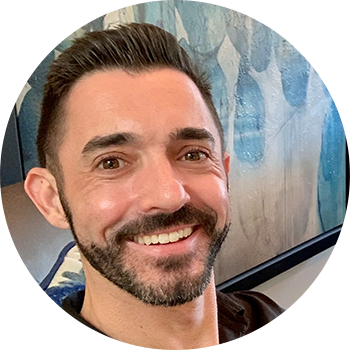
Justin Natoli, JD, LMFT (he/she/they) is a psychotherapist, hakomi practitioner, ketamine therapist, and retreat facilitator. In their private practice in Los Angeles, Justin specializes in depth and somatic psychotherapies, trauma, addiction, psychedelic integration, and working within kink, poly, and LGBTQIA+ communities. Justin also serves on the Chacruna Institute for Psychedelic Plant Medicines’ Women, Gender Diversity, and Sexual Minorities Working Group. They are honored to be a contributing author for Chacruna’s latest book, “Queering Psychedelics.” Justin received a JD with honors from the UCLA School of Law and a Master’s in Depth psychology from the Pacifica Graduate Institute. They have a certificate in psychedelic therapy and research from the California Institute of Integral Studies (CIIS) and are working towards a Ph.D. in Psychedelic Studies from the Awe Foundation and Ubiquity University. For more information, see: http://www.justinnatoli.com
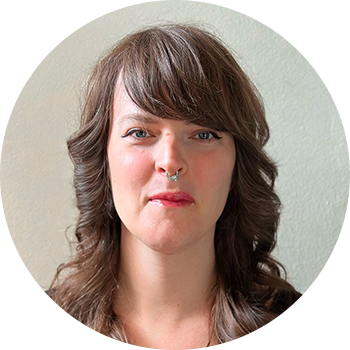
Taylor Dahlia Bolinger (she/her) began her plant medicine practice fifteen years ago, sitting for her friends while they processed the trauma of growing up queer in Texas. This grew alongside helping organize safety teams at regional Burning Man events in Texas. It was the radical acceptance, queerness, and gender fluidity possible in these spaces that led her to embrace her identity as a trans woman. Taylor co-founded Decriminalize Nature Dallas and helped start Street Medics Dallas with her fellow safety volunteers during the George Floyd Uprising last summer. Taylor worked as an ESL teacher for ten years before deciding to pursue medicine work full-time. She has an MA in Linguistics from the University of North Texas in Mesoamerican Linguistic Anthropology and a Master’s in Social Work from the University of Texas at Arlington to work. She is now licensed as an LMSW (Licensed Master Social Worker) and works with homeless LGBT young people. Taylor is a proud gay mom and practices permaculture at home with her partner. Her goal is to be a professional integrative therapist who works with minority populations. She intends to continue to advocate for social change and democratized access to plant medicine.
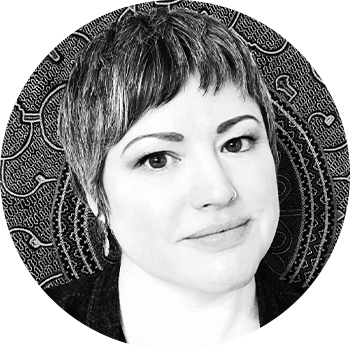
Dee Dee Goldpaugh, LCSW (they/them/theirs), is a psychotherapist in private practice in Woodstock, New York, specializing in sex therapy, trauma, spirituality, psychedelic integration therapy, and ketamine-assisted psychotherapy with LGBTQIA+ clients. Dee Dee has written and presented widely on the topic of psychedelics and sex, queer identity, trauma, and pleasure having authored the first article to appear in an academic journal on psychedelics, spirituality and sexuality. They are a Clinical Supervisor on a research study using psilocybin analogue to treat Major Depressive Disorder, and a member of the Ketamine-Assisted Psychotherapy team at the Woodstock Therapy Center. Dee Dee is currently writing a book about psychedelics, sexual trauma, and reclaiming pleasure due to be published by Inner Traditions in 2024. They are also a proud contributor to the Queering Psychedelics book published by Synergetic Press.
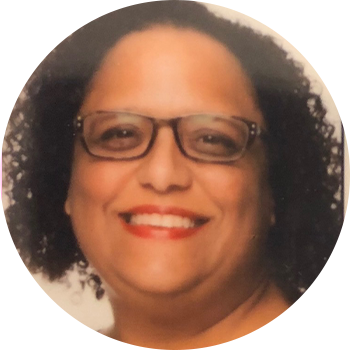
Jennifer C. Jones, PhD, LCSW, is a 52 y.o., multiracial Black, queer, fairly able-bodied, cisgender woman with U.S. citizenship. She co-founded the Rising Caps Collective with Aisha Mohammed to use expansive healing methods to address the traumatic legacies of colonization, slavery and capitalism. Jennifer works with MAPS MPBC as a JEDI consultant and MAT Training Assistant. Since 1998, Jennifer has worked in therapy with individuals who identify as: lgbqa; transgender or gender non-binary; people of color; sex workers; substance users; experiencing class oppression; having a positive HIV status; and/or healing from interpersonal and societal trauma. She has served as the Chief DEI Officer of Philadelphia FIGHT Community Health Centers and a faculty member and the Executive Director of The Gestalt Therapy Training Institute of Philadelphia. As a parent and someone who believes a just world is possible, Jennifer is committed to organizing across color lines creating unity among poor and dispossessed people globally to fight for all of our economic human rights.

Aisha Mohammed, LMFT, is a cisgender, queer, Pakistani-American woman who immigrated from Karachi to Los Angeles as a child. She has been working in harm reduction for a decade with Project SAFE, providing direct services and advocating for the human and labor rights of people who trade sex and use substances. Aisha trained as a family therapist at Drexel University and has worked primarily with low-income families of color, immigrants and people who use substances in community mental health and educational settings. She currently works as a private practice therapist and is co-founder of Rising Caps Collective. She has been doing healing work with people in expanded states for 2 years with her co-founder, Jennifer Jones.
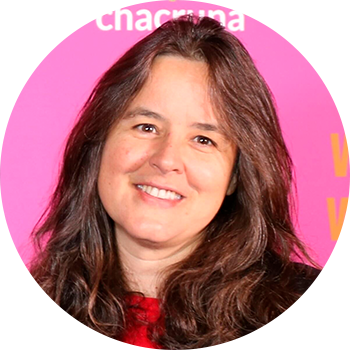
Dr. Beatriz Caiuby Labate (Bia Labate) is a queer Brazilian anthropologist based in San Francisco. She has a Ph.D. in social anthropology from the University of Campinas (UNICAMP), Brazil. Her main areas of interest are the study of plant medicines, drug policy, shamanism, ritual, religion, and social justice. She is Executive Director of the Chacruna Institute for Psychedelic Plant Medicines and serves as Public Education and Culture Specialist at the Multidisciplinary Association for Psychedelic Studies (MAPS). She is also Visiting Scholar at Naropa University’s Center for Psychedelic Studies and Advisor at the Veteran Mental Health Leadership Coalition. Dr. Labate is a co-founder of the Interdisciplinary Group for Psychoactive Studies (NEIP) in Brazil and editor of its site. She is author, co-author, and co-editor of twenty-seven books, two special-edition journals, and several peer-reviewed articles (https://bialabate.net).
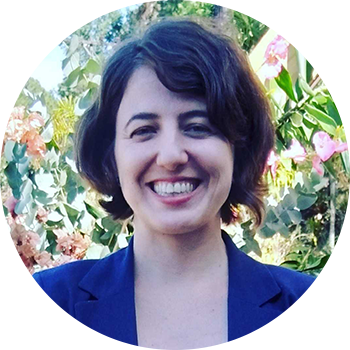
Lígia Duque Platero is Chacruna’s Education Program Associate. She is a queer, cisgender Brazilian woman. She has an interdisciplinary background in history, anthropology and Latin American studies. She holds a bachelor’s degree in history (2005) and a history teacher training qualification (2006) from the University of São Paulo (USP), in Brazil. She has a master’s degree in Latin American Studies from the National Autonomous University of Mexico (UNAM – 2012) in Mexico City, addressing public policies in relation to Indigenous peoples and Indigenous education in Brazil and Mexico from the 1940s-1970s. She has a doctorate in humanities, with an emphasis on cultural anthropology (2018), from the Federal University of Rio de Janeiro (UFRJ), in Brazil. Her PhD looked at the cultural transformations and exchanges amid the alliance between the Yawanawá Indigenous people and an urban church of Santo Daime. Her main research focus areas are: ayahuasca, Santo Daime, sacred plants, shamanic tourism, Yawanawá (Pano) people, Indigenous policies and human rights in Brazil and Mexico. She is a research associate at the Interdisciplinary Group for Psychoactive Studies (NEIP) and at the Laboratory for the History of Religious Experiences (UFRJ/IFCS) in Brazil.
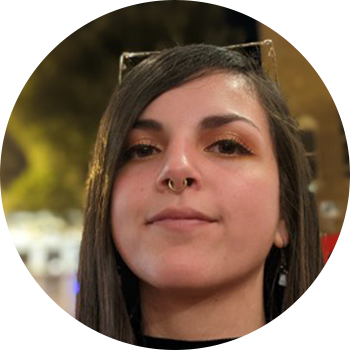
Alejandra Barajas (she/they/him) received her BA in Studio Art and Journalism from Beloit College. As an undergrad, she explored many topics ranging from art to philosophy to anthropology to journalism. Professionally, she has combined these skills in order to build a portfolio of knowledge. She uses an ethnographic approach to understand existence by communicating with different types of people, documenting their life experiences, and sharing this wisdom with the world through different mediums. She began this practice by working with graffiti artists in Chicago and giving them a platform to share their voices in an effort to remove the stigma surrounding this underground culture. During that time, she was a journalist for UP Mag which is a NY based publication focused on street art and politics. She has since shifted her focus to psychedelic plant medicines and is primarily interested in the topics of accessibility for underrepresented communities and promoting indigenous voices. She is Chacruna’s Program Coordinator, producing research, and supporting work on books, chronicles, community forums, in-person events and conferences, courses and with team’s speaking engagements. She is currently based in Washington, DC.
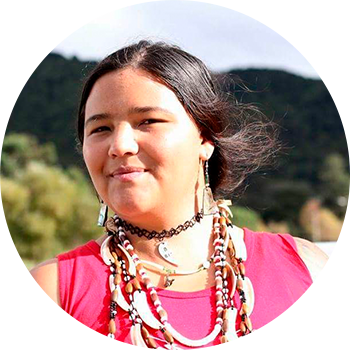
Kanyon Sayers-Roods is Costanoan Ohlone-Mutsun and Chumash; she also goes by her given Native name, “Coyote Woman”. She is proud of her heritage and her native name (though it comes with its own back story), and is very active in the Native Community. She is an Artist, Poet, Published Author, Activist, Student and Teacher. The daughter of Ann-Marie Sayers, she was raised in Indian Canyon, trust land of her family, which currently is one of the few spaces in Central California available for the Indigenous community for ceremony. Kanyon’s art has been featured at the De Young Museum, The Somarts Gallery, Gathering Tribes, Snag Magazine, and numerous Powwows and Indigenous Gatherings. She is a recent graduate of the Art Institute of California, Sunnyvale, obtaining her Associate and Bachelor of Science degrees in Web Design and Interactive Media. She is motivated to learn, teach, start conversations around decolonization and reinidgenization, permaculture and to continue doing what she loves, Art. Kanyon is also the Founder of Indian Canyon Two-Spirit Society, Cultural Director and COO of Costanoan Indian Research and Cultural Representative and Native Monitor for Indian Canyon Mutsun Band of Costanoan Ohlone People.
Take a minute to browse our stock:
Did you enjoy reading this article?
Please support Chacruna's work by donating to us. We are an independent organization and we offer free education and advocacy for psychedelic plant medicines. We are a team of dedicated volunteers!
Can you help Chacruna advance cultural understanding around these substances?


